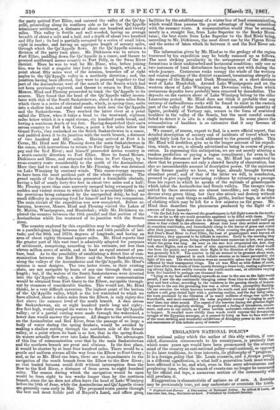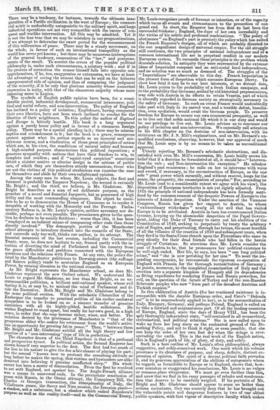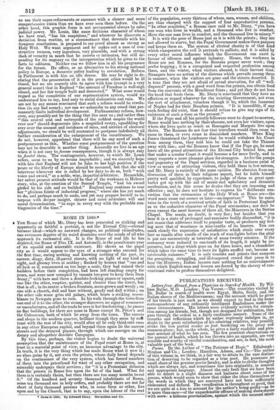ENGLAND'S NATIONAL POLICY*
TEE national policy which the author of this ably written, if one- sided, discussion recommends to his countrymen, is precisely that which some years ago would have 'been pronounced by the average mind of the country ananti-national.poliey—anti-mational, as opposed to its later traditions, its true interests, its philosophy of "progress." it is a foreign policy that Mr. Louis counsels, and a foreign policy, in a different signification, is what half a generation back most won't' have affirmedit to be, and whit, even in this more adventurous and perplexing time, when the march of events can no longer be measured by the official red tape, a numerous section of the community will still proclaim it. Exaggeration is characteristic of nations as of men. A doctrine may be .proximately true, yet may understate or overstate the truth.
England and Europe A Discussion of National Policy. By Alfred H Louis, of Lincolns Inn, Esq., Barrister-at-Lew. Published by Richard. Bentley.
There may be a tendency, for instance, towards the ultimate inau- guration of a Pacific civilization in -the west of Europe ; the commer- cial spirit is undoubtedly antagonistic to the military spirit, and large industrial operations are not very compatible with the career of con- guest and warlike intervention. All this may be admitted. Yet it is not the less true that we may 'be mistaken in our prognostications, if we attempt to determine the exact period for the commencement of this millennium of peace. There may be a steady movement, on the whole, in favour of such an international tranquillity as the world has never yet known ; but there may be-numerous interruptions of the general tendency, suspensions of the "law," and postpone- ments of the result. To correct the errors of the popular political philosophy is, under such circumstances, a salutary work ; and if in the process of correction the censor himself falls into opposite mis- apprehensions, if he, too, exaggerates or extenuates, we have at least the advantage of seeing the utmost that can be said on the hitherto unrepresented side of opinion, and thus of comparing the judgment df the minority, if it be only that glorious minority whose numerical expression is unity, with that of the clamorous majority whose more imposing name is Legion. e symbols of English public opinion have 'been, for a consi-
derable period, industrial development, commercial intercourse, poli- tical and social reform, add non-intervention. The policy of England has inclined to a policy of isolation; Englishmen, having conquered their own liberties, have not been mudh inclined to combat for the liberties Of 'their neighbours. To this ,policy the author Of England and Burge is 'bitterly hostile. His hook is a long argument against a purely home policy and in favour of a strenuous foreign policy. There may be a special pleading in it ; there may be miscon- ception and misstatement in it ; but the book is a grave, courageous protest against what its author regards as an immoral and mis- chievous course, and a vindication of those great principles of action which are, in his .view, the conditions of natural safety and honour. A high-minded purpose characterizes this political exposition'; a generous sympathy-with nations that have their freedom to win, to complete and confirm; and if " squint-eyed suspicion" sometimes detect a sinister motive or ulterior design in the actions of public men, of which they are themselves utterly unconscious, those who are not the victims of this political strabismus can examine the case for themselves and abide by their own enlightened opinion. Among- the many men to whom Mr. Louis objects, the first and i foremost s probably the Emperor Napoleon ; the second is certainly Mr. Bright ; and the third, we believe, is Mr. Gladstone. Mr. Bright be describes as a man of set deliberate purpose, as the- preacher of a moral and financial Jacquerie, but as possessed of high ability and the most commanding eloquence. His object he consi- ders to be so to democratize the House of Commons as to render it incapable of working with the Monarchy and the Peerage. Parlia- mentary Reform is, in Mr. Louis's opinion, neither necessary nor de- sirable, perhaps not even possible. The prominence given to the ques- `tion he declares to be mainly'fictitious : worse than this, it has been "'employed as an indirect means of compassing other ends than those directly -involved." The demagogic portion of the Manchester school attempts to introduce discord into the councils of the State, and succeeds only too-well, thinks our author, in its attempt. The financial measures of the last session, including the Commercial Treaty, were, he does not hesitate to say, framed partly with the in- tention of diverting-the mind of Parliament and the country from the grave difficulties and problems connected with the European questions and the relations with France. At any rate, the policy dic- tated by the Manchester politicians to Downing-street (the suffrage and finance policy) tends to neutralize England as an European Power, by -causing disunion in the national councils.
As Mr. Bright represents the Manchester sohool, so does Mr.
Gladstone represent the new 'Oxford school. We understand Mr. Louis to regard ,Mr. 'Gladstone, no less than Mr. Bright, as an un- statesmanlike politician, a brilliant anti-national speaker, whose evil destiny it is, or may be, to mislead the mind of Parliament and di- vide the Executive. 'Both Mr. Bright -and Mr. Gladstone belong to the same political section. With the scholastic 'Chancellor of the Exchequer the transfer to practical polities of his earlier medireval sympathies is to be Jooked on as a sincere transfer of genuine asceticism with all its highly-gilded, beatific selfishness. He wishes England to stand apart, but really for her own.good, in.a high sense, in order that she may become 'richer, wiser, and betfer. The isolation desired by the gentleman of Manchester is "that of the prosperous abbot who makes his retirement from the world's activi- ties an opportunity for growing-fat-in fat in peace." Thus, "between-them Mr.
'I
Mr. Mr. Gladstone exhibit all the high theory and low practice of a '-non-intervening' type of life in perfection.' The character drawn of the Third Napoleon is that of a profound and prospective tyrant. In political action, the Second 'Emperor has shown-himself very superior to the first. The first had too-much of the lion in his 'nature to give the fox &fair chance of playing his part ; but the second " knows how to protract the crouching' -attitude so kmg, before he makes the spring, -that victims and bystanders are alike deceived into believing it genuine unaffected sleep." His whole- career has been a carder of dissimulation. From the first he resolved to act faith England, not again4 her. The Anglo-French alliance was a means to unavowed ends. 'In the precipitate conclusion of peace with Russia, in the Orsini attempt, the Conspiracy B'll the Charles et Georges transaction, the championship of Italy: the Villafranca peace, the Savoy and Nice cession, the Invasion,panic- a shadow, not a substance, but a -shadow which suited Napoleon's Purpose as well as the -reality itself—and in the-Commercial Treaty, Mr. Louis recognizes proofs of forecast or intention, or of the sagacity which tarns all events and circumstances to the promotion of one grand end. In short, the Emperor has from first to last been the successful trickster ; England, the dupe of her own incredulity and the victim of his subtle and profound machinations. " The policy of abstinence" on England's part is precisely the policy which has suited the French Emperor's designs, all of which are probably directed to the one magnificent design of universal empire. For the old struggle still continues, the two principles of national independence and of common international life are in perpetual -conflict in our modern European system. To reconcile these principles is the problem which demands solution. In antiquity they were represented by the extreme ideas of Imperialist conquest and an anti-social local independence, and no solution was so much as dreamed of. The struggles of the " Imperialisms " are observable to this day. French imperialism is the present form of 'despotism which-menaces European liberty. To show how fatal it may be to our best interests, at 'no distant date, Mr. Louis points to the probability of a fresh Italian campaign, and to the probability that Germany,misled by old historical prepossessions, may side with Austria in its efforts to retain Venetia, part of which is absurdly regarded in German -society as strategically necessary to the safety of Germany. In such an event France would undoubtedly take part with Italy in its sacred war, and a terrible defeat, humilia- tion, even spoliation, -would await the German people. To preserve freedom for Europe to secure our own commercial prosperity, as well as to live out that noble national life which it is our duty and would be our privilege to live -out, Mr. Louis advises us to renounce our policy of isolation and non-intervention. We especially call attention to his fifth -chapter on the doctrine of non-intervention, with its
on 'Mr. J. S. Mill's explanations, and on Mr. Bernard's un- qualified conclusions, observing, however, that our approval of much that Mr. Louis says is by no means to be taken as unconditional approval.
Utterly rejecting Mr. Bernard's scholastic abstractions, and dis- -satisfied with even Mr. Mill's concession, Mr. Louis boldly avows his belief that if a doctrine be formulated at all, it should be— `Interven- tion the rule ; and Non-intervention the exception." He rebukes England's past remissness ; he calls on her to intervene with voice and sword, if necessary, in the reconstruction of Europe, as the one sole " great power which earnestly, and without reserve, longs for the peace, the prosperity, the emancipation of peoples." For, according to Mr. Louis (and to a considerable extent we agree with his view), the disposition of European territories is not yet rightly adjusted. From 1815 the principle of national independence has been formally sacri- ficed by the common consent of the despotic Powers of Europe to the interests of Asiatic despotism. Under the sanction of the Viennese Congress, Russia has given her support -to Austria, to whose "extraordinary wickedness" nearly all the evil that has visited Europe is to be attributed. Austrian turn has countenanced Italian tyranny, keeping up the abominable despotism of the Papal Govern- ment, aiding the Duke of Tuscany to carry out his abolition of the Constitution of 1849, seeking to perpetuate 'bytreaty the arbitrary • rule of Naples, and perpetuating, through her trocps, the most horrible of all the villanies of the reaction of 1850 and subsequent years, when they fired inthe Santa Croce church Upon-the Florentines -who came to
silently for their dead friends who 'had fallen in the heroic struggle of Curtatone. So atrocious does Mr. Lewis consider-the past of Austria to be, that he pronounces her political existence to be well-nigh ended. Her life, he says, has been one long political crime," and "she is now perishing for her sins:" To meet the im- pending emergencies, -he recommends the vigorous co-operation of England with Prussia for 'the thorough reconstitution of Germany ; he ,points, moreover, to the completed emancipation of Italy and the erection into a separate kingdom of Hungary afid its dependencies as fitting expedients-for rendering France and Russia powerless, for evil, on the question of the future of Turkey and-of the non-Russian Selavonic peoples who now '"form part of the decadent Austrian and Turkish empires."
In this obliteration-of Austria-(for her continued existence is in- compatible -with the durable European order, and Cato's "Delenda est' is to be remorselessly applied to her), as in the reconstitution of Italy, Hungary, -Germany, and perhaps Poland, England is called on to tAke a forward and magnanimous part. Of all the leading countries of Europe, England, since -the days of Henry VIII., has been the wily thoroughly independent state," self-contained in all monarchical, ecclesiastic, and political relations." She is now -called upon to wake up from her long sleep on the enchanted ground of the Do- nothing Policy, and not to think it right, or even possible, that she can keep the soles of her own feet dry when the deluge is over- spreading the earth. This is the real work of the English nation, this is England's path of life, of glory, of duty, and safety.
Such is a bare outline of Mr.Zotus's often philosophical, always suggestive, and nobly.conceived work. One merit which his volume possesses is its clearness of purpose, and sharp, definite, distinct ex- pression of opinion. 'The spirit of a devout political faith pervades it, and its generous appreciation of the abilities of antagonists whom he regards as formidable to Europe or to England, shows that, how- ever mistaken or exaggerated his conclusions, Mr. Louis is no vulgar or commonplace vituperator. We must go even further than this, and avow that we find in his essay passages of rebuke and condemna- tion that deserve to be carefully weighed. If his portraits of Mr. Bright and Mr. •Gladstone should appear to some no better than serious caricatures, they can scarcely deny that he has brought out the vulnerable points and dangerous features in two of our ablest public speakers, with that vigour of -descriptive 'faculty which makes
us see their super-refinements or excesses with a clearer and more comprehensive vision than we have ever seen them before. On the other hand, this graphic force is not accompanied always by calm judicial power. Mr. Louis, like some fictitious character of whom we have read, "has his suspicions," and wherever he discovers a deviation from routine, or a circumstance that dovetails with his foregone conclusions, is prepared to see proof almost as strong as Holy Writ. We want argument and he makes out a case of con- structive treason, very ingenious, very plausible, and with a strong dash of veracity in much that he asserts or intimates, but still de- pending for its cogency on the interpretation which he gives to the facts lie adduces. Neither can we follow him in all his programme for the future. He offers, as an alternative to his strong national policy in Europe, a domestic policy leading to revolution. Reform in Parliament is with him an idle dream. He may be right in de- claring that the prosecution of it in the present crisis would be ill timed, but we are scarcely able to agree with him (except in a very general sense) that in England "the account of Freedom is well-nigh closed, and her fair temple built and decorated." What some would regard as the completion of our representative system, would we understand him to say, lead only to social dislocation and ruin. We are not by any means convinced that such a reform would be revolu- tion (in any bad sense) ; nor can we subscribe to any creed that per- manently limits individual development. Parliamentary reform, how- ever, may possibly not be the thing that lies next us ; and rather than "this central seat and metropolis of the noblest empire the world ever saw" should degenerate into a magnified vestry, squabbling for ever over the amount and incidence of rates, and niceties of electoral adjustments, we should be well contented to postpone indefinitely all further consideration of the enlargement of the constituency. We do not, however, apprehend that there will be any need of such a postponement as this.. Whether some postponement of the question may not be desirable is another thing. Assuredly we live in an age when it is not easy to foresee consequences, though it is always easy toforetel them. The contingencies, however, to which Mr. Lows refers, seem to us by no means improbable; and we sincerely hope
with him that England will not be false to her high position if the peace or the liberty of Europe should be menaced, but that she will intervene whenever she is called by her duty to do so, both "with voice and sword," as a noble, wise, impartial arbitrator. Meanwhile, her safest present attitude would be that of the workman in Hebrew story, who, at the erection of the Second Temple, "had his sword
girded by his side and so builded." England may continue to rear her "glorious fabric of industrial progress," where she has yet much to do, and perhaps much to undo, and yet may prepare herself to in-
terpose with deeper insight, clearer and more articulate will and moral determination, "to cope in every way with the probable con- tingencies of the time."
































 Previous page
Previous page